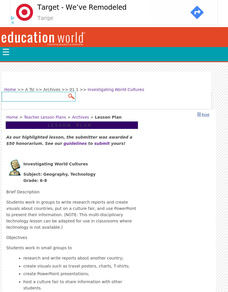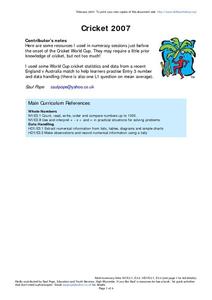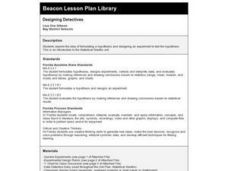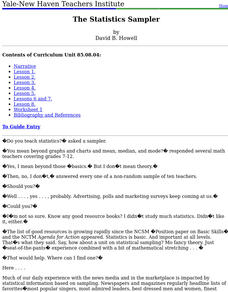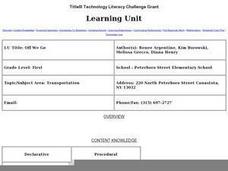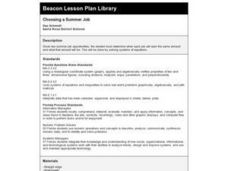Curated OER
"Math Curse" by Jon Scieszka & Lane Smith
Students use estimation and measurement skills to make predictions and solve problems involving length.
Curated OER
Investigating World Cultures
Learners, in groups, write research reports and create visuals about countries, put on a culture fair, and use PowerPoint to present their information.
Curated OER
Down by the Bay
Students listen to teacher read books about fish and participate in activities in order to explore how to identify bluefish. They count and graph the numbers of fish they find in simulated fishing activities.
Curated OER
You Can't Go Wrong with a Right Triangle 2
Upper graders use the properties of right angle trignonmetry to measure objects such as the school flagpole. They solve real world problems using these properties.
Curated OER
Meatiest States: Graph Problem Solving
In this graph problem solving worksheet, students analyze a graph that shows commercial red meat production in five states. Students answer 5 word problems using the data on the graph.
Curated OER
Count by 2's
In this basic mathematics worksheet, students complete each chart by counting by 2's. They add to each number and fill in the missing boxes.
Curated OER
Cricket 2007
In this math and sports worksheet, students read and review the statistics from the performance of teams in the Cricket World Cup. They identify which team played the most matches and who won the most. Students also compare the...
Curated OER
Addition Number Chart
For this basic mathematics worksheet, 1st graders complete each chart by filling in the missing numbers. They use addition to help them complete each chart.
Curated OER
Musher Graphing and Probability
Young scholars use the internet to research statistical information on the musher dogs participating in the Iditarod. Using the data, they create three different types of pie charts. They use the charts to answer questions about the...
Curated OER
How Far!
Fourth graders perform basic calculations using time. They read and construct a variety of scales, timetables, and charts. Students devise and use problem solving strategies to explore the situation mathematically.
Curated OER
Graphing a Healthy Lifestyle
Fifth graders record the amount of time they spend sleeping, attending school, watching T.V., exercising and doing homework. At the end of the week they graph all of their information and discuss how sleep impacts their learning....
Curated OER
Bald Eagle Population Graphing
Students create graphs to illustrate the bald eagle population. They identify the population of bald eagles in Minnesota and the United States. They create three graphs to represent the population data including a line, bar, and...
Curated OER
Recording Treasure
Young scholars participate in a garage sale. They will weigh the items sold. They will calculate the total weight of items sold and donated to an agency.
Curated OER
Sequencing
Second graders retell a story focusing on sequence. in this sequence lesson, 2nd graders read the story Carry Go Bring Come by Vyanne Samuels. They retell parts of the story and put them in the correct order.
Curated OER
Lobster Roll!
Students collect data by playing a game that illustrates the delicate ecological balance between fishing, fishing regulations and fish populations. They graph and analyze the data and explain how economic decisions can affect the...
Curated OER
Designing Detectives
Third graders explore the idea of formulating a hypothesis and designing an experiment to test the hypothesis.
Curated OER
An Encyclo-ME-dia for Every Child
Young scholars create a digital scrapbook that shows information-text and pictures that are specific to each child. They make charts and graphs. They use digital cameras, scanners, software, to write captions, stories, poems, letters,...
Curated OER
For The Birds
Seventh graders list the features of an ecosystem and identify local bird species. In this bird lesson students work in groups to formulate a hypothesis and test their theory by collecting and analyzing data.
Curated OER
Chronic Conics
Fourth graders use two activities to draw four different conic sections. One activity is of a physical nature and one is traditional paper and pencil.
Curated OER
Rhyming Word Poems
Students create poetry. For this poetry lesson, students read poetry and identify rhyming words using highlighters. Students may also add rhyming lines to the poetry they read.
Curated OER
Data Collection and Presentation
Students concentrate on discrete quantiative data. They are shown that the vertical line diagram as a more appropriate way to present discrete quantiative data then bar charts. Students work as a group to help with the interpretation...
Curated OER
The Statistics Sampler
Students define sample, describe a random sample, and discuss what compromises a sample. They determine a sample size to estimate a population characteristic with confidence.
Curated OER
Off We Go
First graders identify different types of transportation, and explain why each is important. They pretend they are going on a trip. They choose their mode of transportation, and use play money to buy their tickets.
Curated OER
Choosing a Summer Job
What did you do over your summer vacation. Young wage earners must compare summer job options, and determine when each job earn the same amount and what that amount be. This be done by creating, graphing, and solving systems of...



